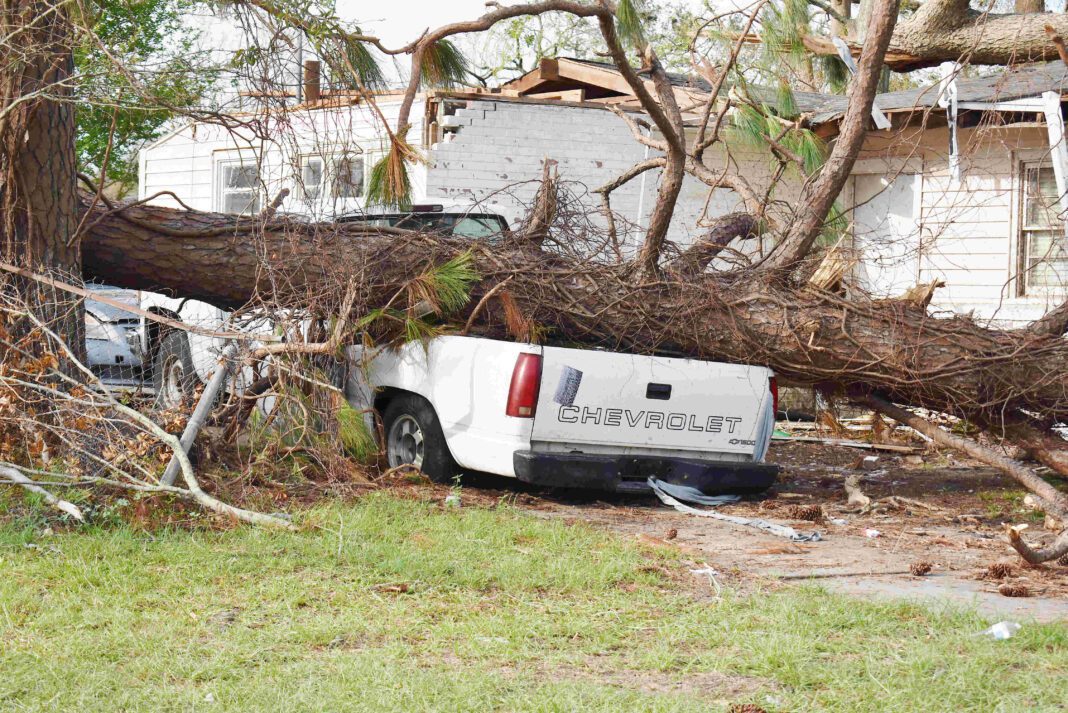LAKE CHARLES, LA. – After delivering hurricane relief supplies Wednesday morning to this city hard hit by Hurricane Laura, Swordfish Grill General Manager Bob Slicker and The Sun toured the extensive damage sustained in the surrounding neighborhoods.
Water’s Edge Gathering church volunteers Luke Cooper and Brittany Straub provided the tour of their devastated hometown. Cooper is a local musician who sings and plays guitar and keyboards. He also is a member of the Water’s Edge Gathering church band.
“Almost every musician in Lake Charles has a gig in a church because it pays well,” he said.
Straub had been working as a nurse, but she quit her job on Aug. 14 to focus on earning a degree that will allow her to become a crime scene investigator.
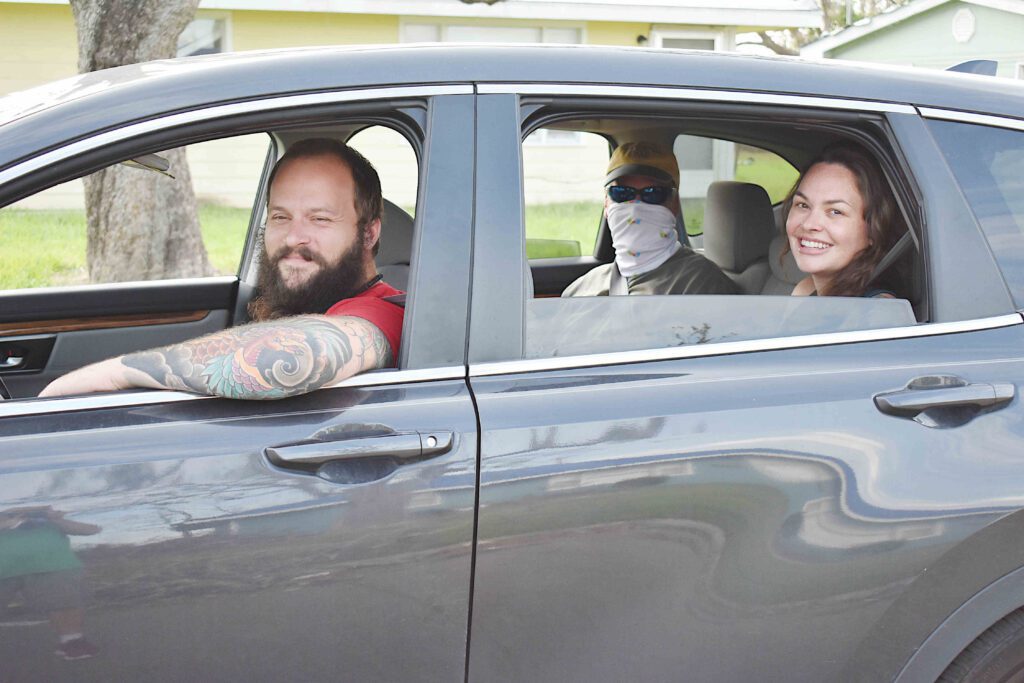
Before Hurricane Laura hit on Aug. 27, Cooper and Straub and Straub’s son evacuated to San Antonio with her parents.
Their apartment building in Lake Charles survived the hurricane, but Straub and Cooper’s apartment suffered water damage and is still without power. The couple is currently staying at her parents’ home in nearby Beaumont, Texas.
In Lake Charles, water service had been restored in many areas, but electricity remains scarce.
“There’s not a neighborhood that’s gone untouched in Lake Charles. This is a lower-income area and it got hit brutally. We’re 30 miles inland. The further south you get, the worse it gets,” Cooper said, noting the small coastal city of Cameron was essentially demolished by the hurricane and storm surge.
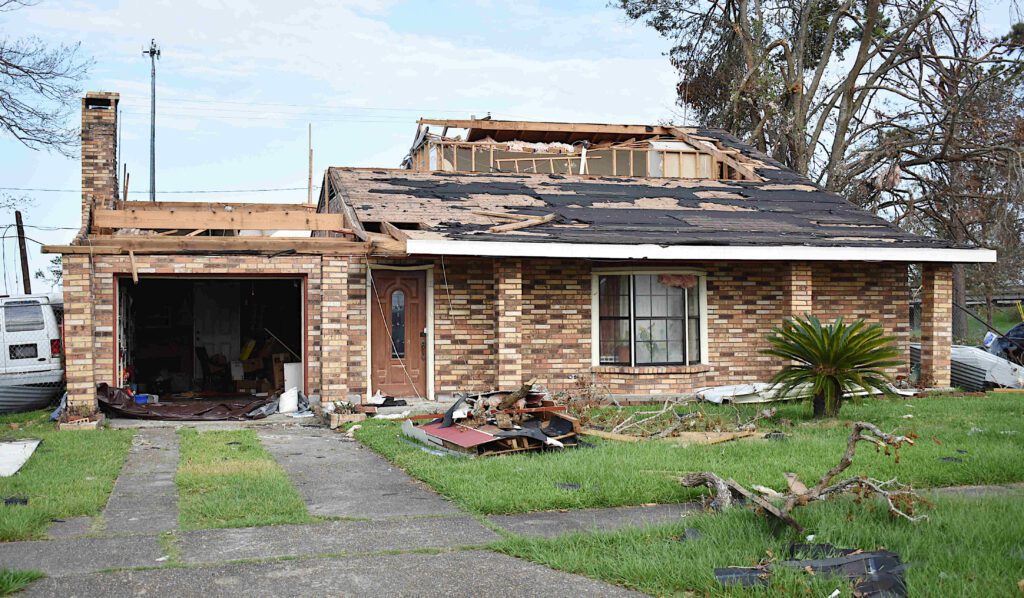
“Most of the damage happened in the poorer neighborhoods and the older homes got hit the hardest. Unfortunately, we’re finding out that there’s quite a few people that didn’t have home insurance, so they’re going to be at the mercy of FEMA – and so far, that’s not been very much help. We’re afraid quite a few people are going to have to leave with whatever they get. Our poorer community members don’t have much of a choice. A lot of them rebuilt after Hurricane Rita 15 years ago and to rebuild again may be impossible,” Cooper said.
“It’s also a lot of older people and a lot of vets on social security and disability, so rebuilding this neighborhood is going to be hard. They have money to relocate, not to rebuild,” Straub said.
Cooper said he’s heard of homeowners being offered only $10,000 in FEMA funds, but a local attorney’s office has reached out and offered its assistance.
“They’ve been incredibly helpful with the appeals process for FEMA – and what we’re empowered to do and how we can hold everybody’s feet to the fire,” Cooper said.
Most homes in the area toured on Sept. 9 had at least one tarp on the roof and many were covered with multiple tarps, including some that were professionally installed and included spray-painted ID numbers.
“That’s the Army Corps of Engineers. They started going to the houses of the people who signed up for help,” Cooper said.
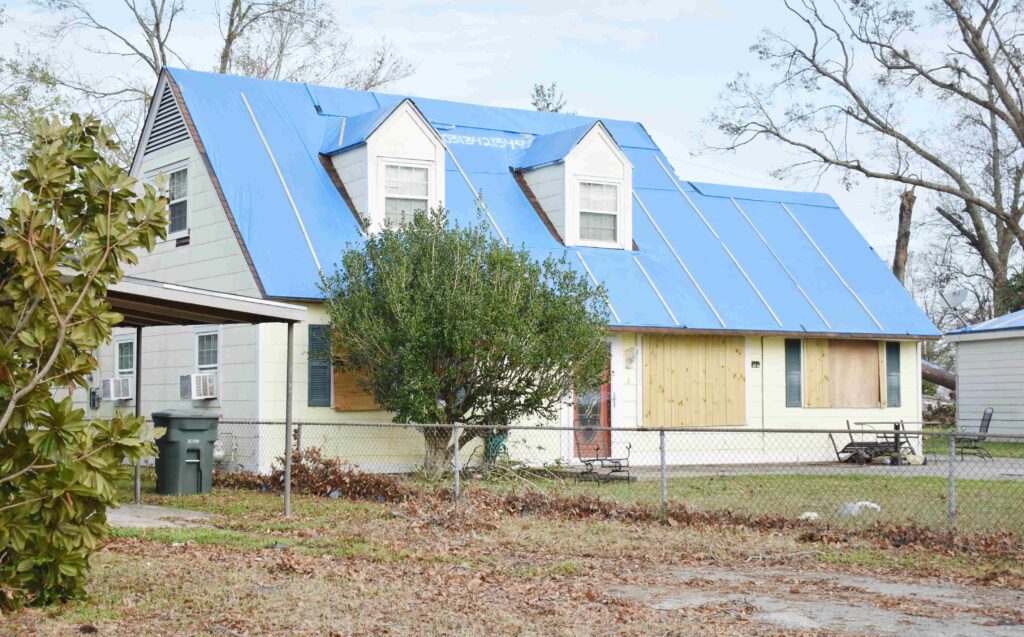
While approaching the Tommasi Mobile Village, Straub pointed to the wire fence across the street and said, “The fence was filled with all the skirting and siding from the trailers.”

Straub also noted most of the power poles at the far end of that field were tilted to the left.
“I don’t think one place looks habitable,” Slicker said of the damage that included a fifth-wheel trailer turned on its side and significant damage to many mobile homes.
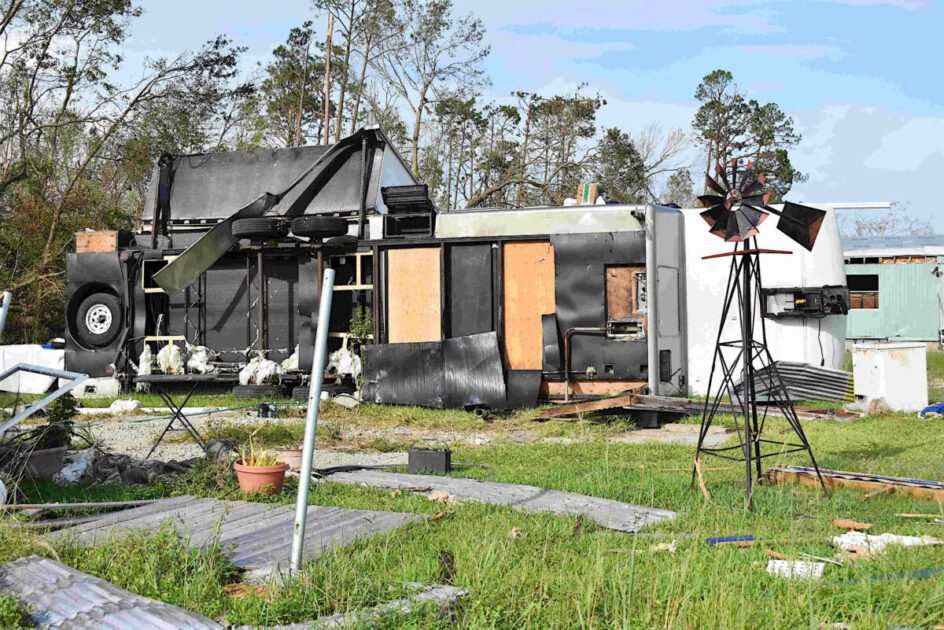
Regarding the local schools, Straub said, “Ninety-seven percent of all the schools in the school district have severe damage. They haven’t even started yet. With COVID, they were figuring out the virtual learning or the in-person learning, and then this hit. They were supposed to start the 24th and then this happened.”
When passing a large church building that was missing its second story wall, Straub said that was the Glad Tidings church building used for Sunday school and other youth education purposes.
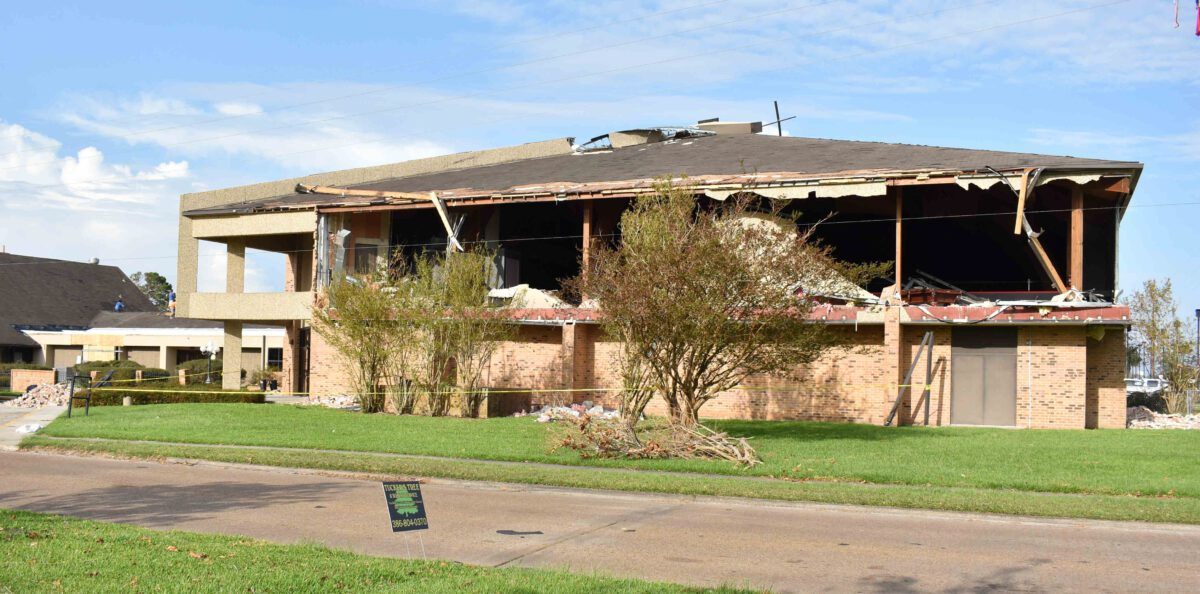
Regarding the local churches’ role in the recovery efforts, Cooper said, “We have a bunch of churches that are doing all they can, but a lot of churches were completely devastated. Trinity Baptist fared pretty well. They have a supply delivery and hot food every day. We’ve got people fixing our facility right now so we can do the same. We normally have a food pantry every week, but for the time being it’s a liability issue having people come into a potentially moldy facility.”
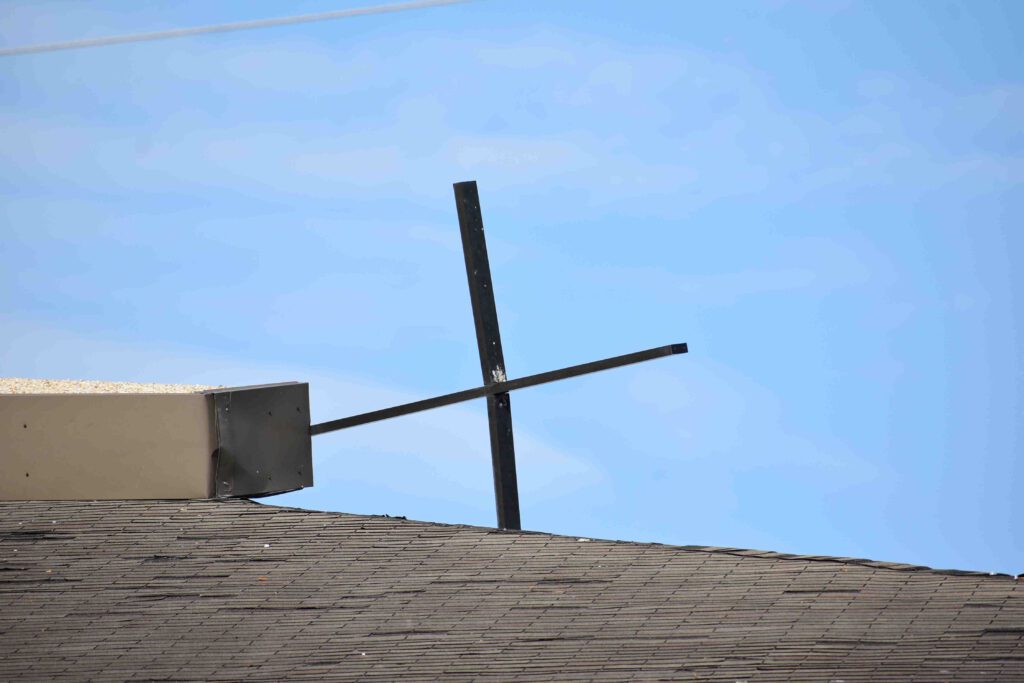
Cooper said the Biolab chemical manufacturing plant in Lake Charles caught fire after the hurricane passed and leaked chlorine gas. Straub said a casino boat broke free and rammed a bridge near the scene of the fire and those two incidents resulted in the I-10 bridge being closed for several days.
Cooper said Hurricane Laura may have inadvertently resolved a debate regarding a Confederate statue.
“Most of the community spoke out in favor of removing it. Lake Charles is 52% African American, but some of the votes don’t go that way. The city council voted to keep the statue regardless of the public outcry and then Laura came and destroyed it. They picked it up the next day,” Cooper said.
Straub said Lake Charles residents are doing their best under trying circumstances.
“Lake Charles has fared well. There hasn’t been a whole lot of crime. This city is really special when things like this happen. It’s really tight-knit. There’s been some looting, but it’s nothing compared to previous storms,” she said.
Straub said a 14-year-old girl in nearby Leesville was killed by a fallen tree during the storm. Now the concern is about people dying due to the improper use of generators. According to NPR, five people in one Lake Charles home died of carbon monoxide poisoning after fumes from a generator running in the garage entered the home through an open or partially open door.
Jobs and the economy
“The port and the oil and gas industries are huge here. Most of our people are working-class people and now none of us have jobs. Our small businesses were already crippled because of COVID-19,” Cooper said.
“The jobs are gone. People are coming to town to work on the cleanup or local people are hiring on with cleanup crews. That’s kind of what we’ve got right now,” Straub added.
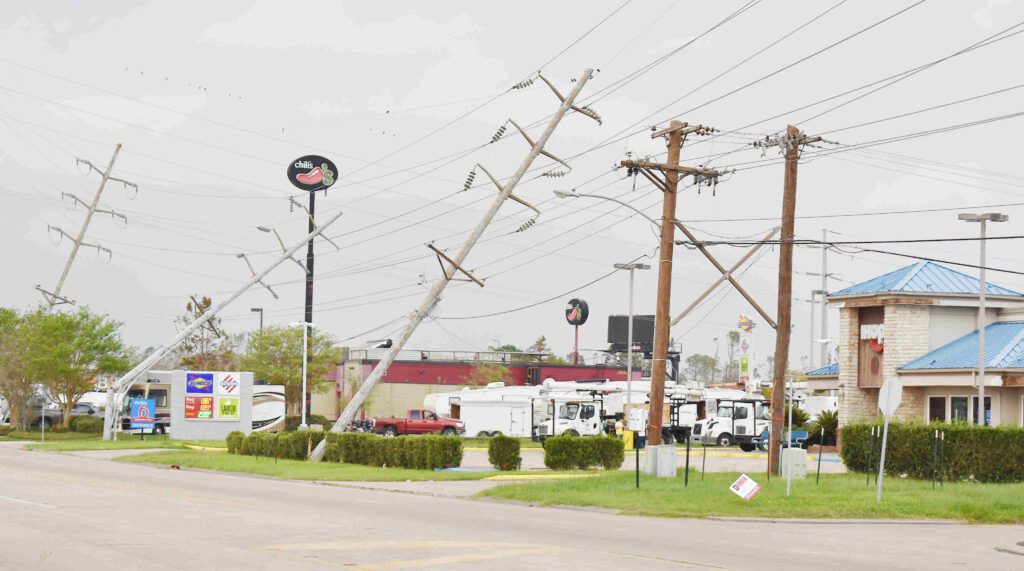
Cooper said he’s only aware of a handful of businesses that are currently open, including the Walmart store.
Straub was in the Air Force and was not living in Lake Charles when Hurricane Rita hit in 2005. Cooper endured Hurricane Rita and the recovery and rebuilding processes that followed.
“You were here in 2005 and you don’t want to leave?” Slicker asked.
“I do now. I don’t want to do this again. I want to clean up and I want to help, but I don’t want the stress of this again. It’s too much,” Cooper said.
“I don’t want to leave, but we’ve talked about relocating anyway. Is now the time? There’s definitely going to be turnover,” Straub said.
“We’re looking at central Texas,” Cooper said.
“Austin,” Straub added.
“Dallas or Austin,” Cooper said.
Government response
“Our mayor, Nic Hunter, is doing a great job. He’s boots on the ground, bringing generators to old people who didn’t want to evacuate. He’s making sure they get their medicine and stuff like that,” Cooper said.
“Lafayette is the closest city to here and they refused refugees from Lake Charles because they were afraid of ‘rabble-rousers’ coming in and disturbing the peace. Their churches were opening their doors to accommodate the displaced people and they were told they couldn’t do that. Josh Guillory is their mayor-president. He’s terrified of ANTIFA invading,” Cooper said.
According to The Acadiana Advocate newspaper, Guillory’s chief administrative officer distributed an email urging shelter providers to pause any action to establish shelters. Concerns about outside agitators coming to Lafayette stemmed in part from tensions already being high in that city due to ongoing protests pertaining to a recent police shooting. The Washington Post picked up on The Acadiana Advocate’s reporting on the refugee shelter story.
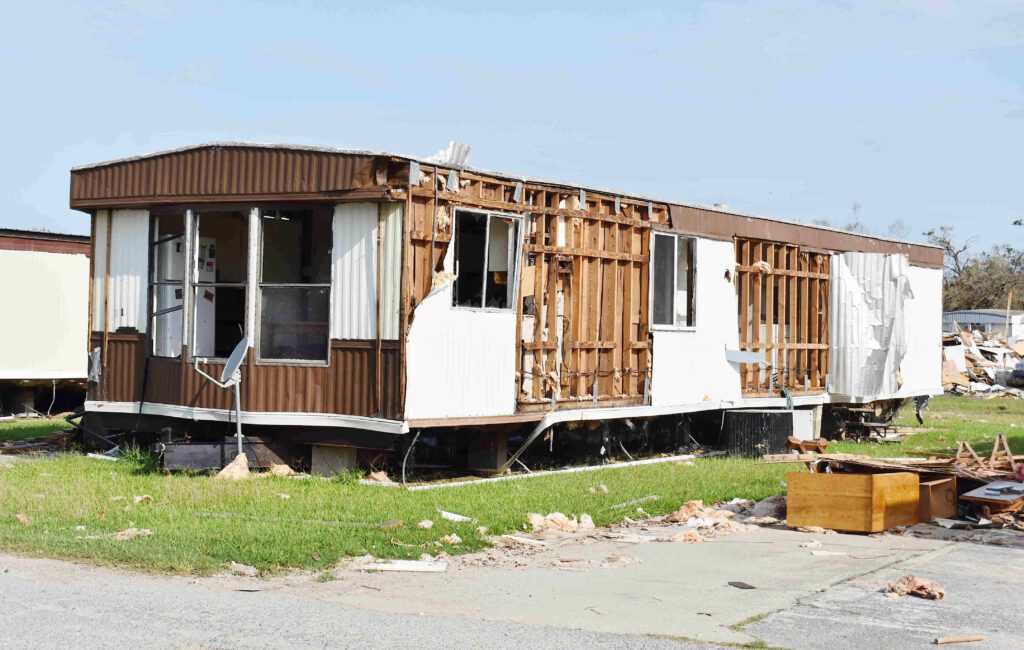
When asked about Gov. John Bel Edwards’ statewide relief and recovery efforts, Straub said, “He said we dodged a bullet. He was referring to us not getting the storm surge that was predicted. We did dodge a bullet by not getting the storm surge, but when people heard that they assumed we dodged a bullet altogether and that’s hurt us. We’re suffering for it.”
Cooper said, “I think he did great with COVID, but he underplayed this and it affected how people carried the story.”
Media and social media
Straub said a local TV station suffered significant damage.
“Their whole tower collapsed,” Straub said.
“Our mayor said he’s worried that because this is a smaller community, about 80,000 people, people are going to turn a blind eye and it will be forgotten,” Cooper said of the national media’s brief coverage of the hurricane damage in Lake Charles.
Slicker noted Lake Charles is the state’s fifth-largest city.
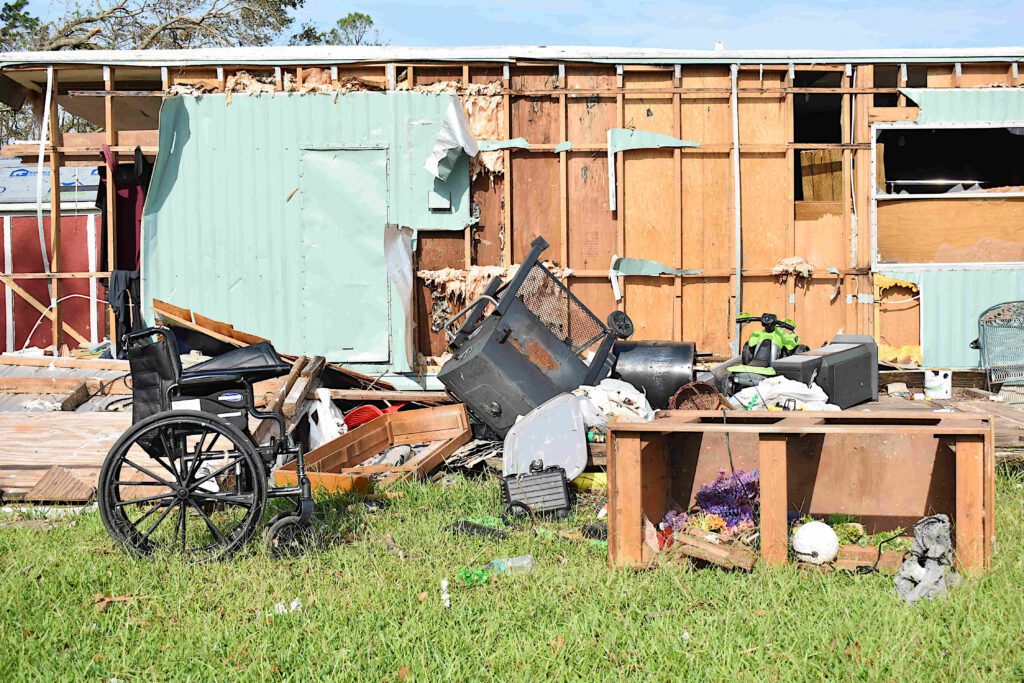
“We have people that are trying to be as vocal as they can to raise awareness of the situation. What we’ve found, especially from the people in Florida, is that anybody that’s aware of the level of destruction that occurred really cares. I’m not worried about people caring, I’m worried about people not being aware of our situation. Florida has come through strong and we thank you so much,” Cooper said.
The national media may be gone, but social media platforms are being used to raise awareness of the ongoing struggles in Lake Charles.
Cooper said the Water’s Edge church received a truckload of supplies earlier in the week as a result of a TikTok video Lake Charles resident Tara Parks shared online.
“That’s gotten a lot of attention. She made a TikTok to explain what it’s like to be on the ground living with two children in a tent and not knowing when you’re going to get water or electricity again. So, we’ve seen traction with social media moving the needle. It’s such an asset,” Cooper said.
Cooper said his friends who stayed for the hurricane used and continue to use Facebook and other social media platforms to find out where food, water, ice and other supplies can be found.
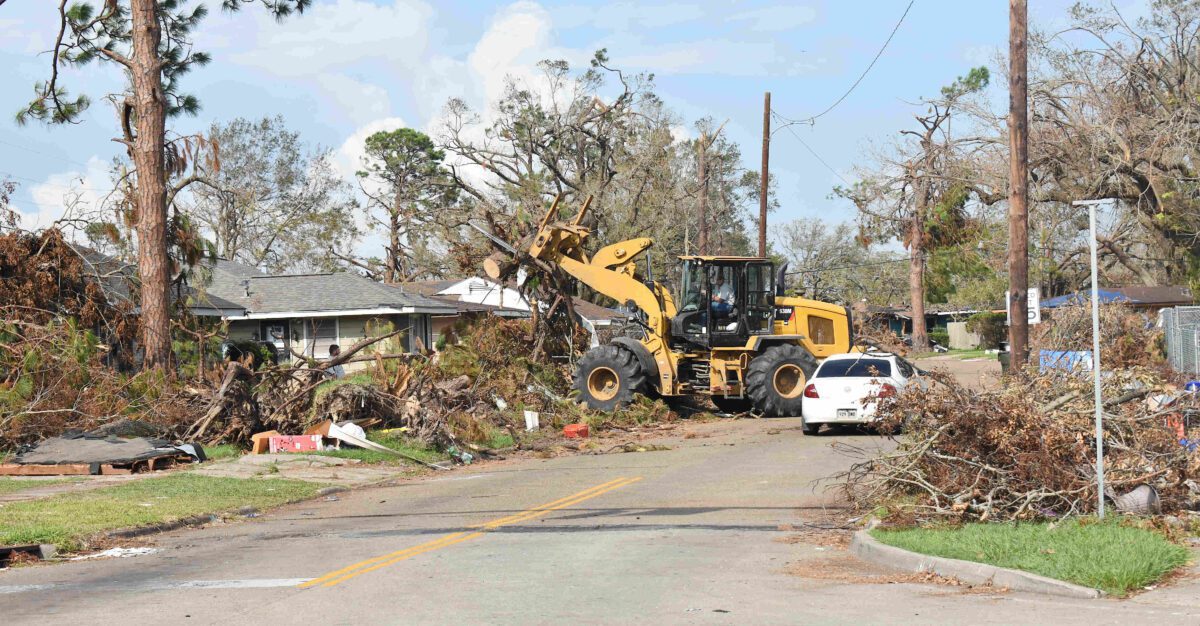
Related coverage
Swordfish Grill delivers hurricane relief supplies















